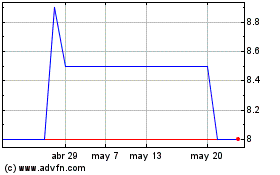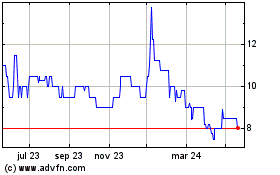TIDMANIC
RNS Number : 6926K
Agronomics Limited
23 December 2022
23rd December 2022
Agronomics Limited
("Agronomics" or the "Company")
Portfolio Company Solar Foods Receives a EUR34 million Grant
to
Support Funding for its First Fermentation Commercial
Facility
Agronomics, the leading listing company in cellular agriculture,
is delighted to share that its Finnish portfolio company Solar
Foods Oy, "Solar Foods", focused on commercialising its Solein
protein made from air, has received a EUR34 million grant to
support the build of their first fermentation facility and start
preparations for their full scale facility. Agronomics has invested
a total of EUR 6 million to date and owns approximately 5.80% of
Solar Foods, subject to conversion of the outstanding CLN.
The full announcement is set out below without any material
changes.
Solar Foods receives a EUR34 million grant to ramp-up Factory 01
and start preparations for Factory 02
Business Finland has approved a EUR34 million grant funding to
Solar Foods. To date, this is the single largest public grant
funding for cellular agriculture in the world. The grant is the
first batch of funding for Solar Foods due the recent IPCEI
notification.
In September 2022, Solar Foods was selected to be a part of the
European Commission's strategic hydrogen economy core. Solar Foods'
EUR600 million investment programme, which also includes the future
Factory 02, was notified as a hydrogen IPCEI (Important Project of
Common European Interest) project with a maximum state aid of
EUR110 million.
In alignment with the R&D phase plan of the IPCEI
notification, Solar Foods will use the grant to ramp up its
hydrogen fermentation facility, Factory 01, and enter the
engineering phase with the following Factory 02.
The 'hydrogen IPCEI' initiative is about research, innovation,
and first industrial deployment (FID) of relevant infrastructure in
the European hydrogen value chain. The grant decision announced
today supports the first phase of the IPCEI project roadmap where
the engineering, construction and ramp-up of Solar Foods Factory 01
is a central piece.
"With Christmas on the doorstep, we will see social media full
of unboxing videos. For us, this grant is not a Christmas present
but the result of one and a half years of negotiation and the hard
work done by the people behind the Finnish innovation system", Pasi
Vainikka, CEO and co-founder of Solar Foods says.
"The grant demonstrates how Finland's innovation system is ready
to think outside the box and wants to support the commercialisation
of scientific discoveries emerging from the intersections of
scientific disciplines. We do not really fit into any single
traditional research and innovation category: we do clean-tech,
food-tech, hydrogen technology and on a systemic level support the
restoration of natural ecosystems."
Solar Foods' Factory 01 has reached its full roof height at
Vantaa, Finland, and process installations are set to begin on
Q1/2023. Factory 01 is aimed to be fully operational in Q1/2024.
The data and operational experiences from the factory are applied
in finalising the engineering for Factory 02.
What is Solein?
-- Solein is a microbial protein-rich powder that contains all
the essential amino acids. It can be used to replace existing
proteins in a variety of foods, for example in alternative dairy
and meat, different snacks and beverages, noodles and pasta, or
breads and spreads. It is the first ever novel food disconnected
from the limits of traditional agriculture. This type of production
method has the potential to transform the sustainability,
availability and transparency of what we eat and where food can be
produced.
-- Solein is produced using a bioprocess where microbes are fed
with gases (carbon dioxide, hydrogen, and oxygen) and small amounts
of nutrients. The bioprocess resembles winemaking, with carbon
dioxide and hydrogen replacing sugar as the source of carbon and
energy, respectively.
-- Solein is 65-70% protein, 5-8% fat, 10-15% dietary fibres and
3-5% mineral nutrients. The macronutrient composition of Solein
cells is very similar to that of dried soy or algae. Solein
provides iron and B vitamins and is exceptionally functional.
Solein can be used with a wide variety of other ingredients: it
vanishes into foods and doesn't change the taste of familiar,
everyday food products.
-- The production of Solein is not reliant on agriculture,
weather, or climate: it can be produced in harsh conditions such as
deserts, Arctic areas, even space. The process does not require
animals or photosynthetic plants, making Solein the world's most
sustainable protein.
-- Solein will become available for commercial use for the first
time. It is aimed at food brands looking for nutritious,
functional, and sustainable protein ingredients of consistent
quality that can be reliably delivered for their products.
Singapore is the first market to grant Solein a regulatory
approval, but Solar Foods is also seeking authorisations in other
markets across the world.
-- Factory 01 is Solar Foods' first commercial production
facility, which will begin to produce Solein in 2024. Construction
of the facility started in Vantaa, Finland during Q4 2021. Factory
01 will scale Solein production to a level where it can be brought
to market for the first time. Solar Foods has plans to expand its
network of production facilities in the coming years.
-- Learn more about Solein at www.solein.com
For more information and requests for interviews:
Solar Foods Ltd.
Pasi Vainikka
DSc (Tech), CEO
pasi@solarfoods.com
+358 10 579 3286
About Solar Foods Ltd .
Solar Foods produces protein using carbon dioxide and
electricity. Solein production, independent of weather and climate
conditions, liberates global protein production from the
constraints of traditional agriculture. Solar Foods was founded in
Espoo, Finland, in 2017 by Dr Pasi Vainikka, Dr Juha-Pekka
Pitkänen, Sami Holmström, Jari Tuovinen, Professor Jero Ahola, and
Janne Mäkelä as a spinoff from VTT Technical Research Centre of
Finland and LUT University. www.solarfoods.com
About Agronomics
Agronomics is a leading listed alternative proteins company with
a focus on cellular agriculture and cultivated meat. The Company
has established a portfolio of over 20 companies at the Pre-Seed to
Series C stage in this rapidly advancing sector. It seeks to secure
minority stakes in companies owning technologies with defensible
intellectual property that offer new ways of producing food and
materials with a focus on products historically derived from
animals. These technologies are driving a major disruption in
agriculture, offering solutions to improve sustainability, as well
as addressing human health, animal welfare and environmental
damage. This disruption will decouple supply chains from the
environment and animals, as well as being fundamental to feeding
the world's expanding population. A full list of Agronomics'
portfolio companies is available at https://agronomics.im/ .
About Cellular Agriculture
Cellular Agriculture is the production of agriculture products
directly from cells, as opposed to raising an animal for slaughter,
or growing crops. This encompasses cell culture to produce
cultivated meat and materials, and fermentation processes that
harness a combination of molecular biology, synthetic biology,
tissue engineering and biotechnology to massively simplify
production methods in a sustainable manner.
Over the coming decades, the source of the world's food supply
traditionally derived from conventional agriculture is going to
change dramatically. We have already witnessed the first wave of
this shift with the consumer adoption of plant-based alternative
proteins but today, we are on the cusp of an even bigger wave of
change. This is being facilitated by advances in cellular
agriculture. This change is necessary, given scientists claims that
if we maintain existing animal protein consumption patterns, then
we will not meet the Paris Agreement's goal of limiting warming to
1.5 '
AT Kearney, a global consultancy firm, projects that cultivated
meat's market share will reach 35% by 2040. This combined with the
Good Food Institute's estimate that a US $1.8 trillion investment
will be required in order to produce just 10% of the world's
protein using this technology, means that we are on the cusp of a
multi-decade flow of capital to build out manufacturing facilities.
Funding in the field of cellular agriculture is accelerating,
however still less than US$ 4 billion has been invested worldwide
since the industry's inception in 2016.
This information is provided by RNS, the news service of the
London Stock Exchange. RNS is approved by the Financial Conduct
Authority to act as a Primary Information Provider in the United
Kingdom. Terms and conditions relating to the use and distribution
of this information may apply. For further information, please
contact rns@lseg.com or visit www.rns.com.
RNS may use your IP address to confirm compliance with the terms
and conditions, to analyse how you engage with the information
contained in this communication, and to share such analysis on an
anonymised basis with others as part of our commercial services.
For further information about how RNS and the London Stock Exchange
use the personal data you provide us, please see our Privacy
Policy.
END
MSCBKBBNKBDBABB
(END) Dow Jones Newswires
December 23, 2022 02:00 ET (07:00 GMT)
Agronomics (AQSE:ANIC.GB)
Gráfica de Acción Histórica
De Dic 2024 a Ene 2025

Agronomics (AQSE:ANIC.GB)
Gráfica de Acción Histórica
De Ene 2024 a Ene 2025
